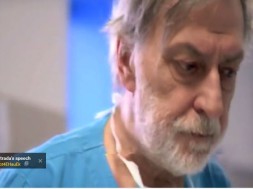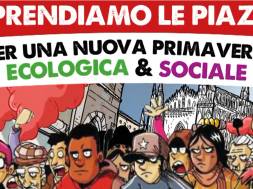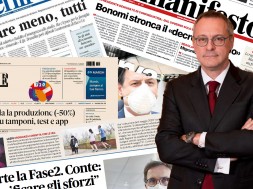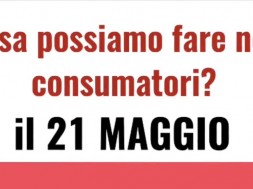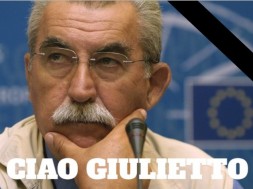GINO STRADA: ABOLIRE LA GUERRA UNICA SPERANZA PER L’UMANITÀ
Il video ed il testo integrale del discorso pronunciato da Gino Strada, fondatore di EMERGENCY, nel corso della cerimonia di consegna del Right Livelihood Award 2015, il “premio Nobel alternativo”
Fonte : Emergency
Io sono un chirurgo. Ho visto i feriti (e i morti) di vari conflitti in Asia, Africa, Medio Oriente, America Latina e Europa. Ho operato migliaia di persone, ferite da proiettili, frammenti di bombe o missili.
A Quetta, la città pakistana vicina al confine afgano, ho incontrato per la prima volta le vittime delle mine antiuomo. Ho operato molti bambini feriti dalle cosiddette “mine giocattolo”, piccoli pappagalli verdi di plastica grandi come un pacchetto di sigarette. Sparse nei campi, queste armi aspettano solo che un bambino curioso le prenda e ci giochi per un po’, fino a quando esplodono: una o due mani perse, ustioni su petto, viso e occhi. Bambini senza braccia e ciechi. Conservo ancora un vivido ricordo di quelle vittime e l’aver visto tali atrocità mi ha cambiato la vita.
Mi è occorso del tempo per accettare l’idea che una “strategia di guerra” possa includere prassi come quella di inserire, tra gli obiettivi, i bambini e la mutilazione dei bambini del “paese nemico”. Armi progettate non per uccidere, ma per infliggere orribili sofferenze a bambini innocenti, ponendo a carico delle famiglie e della società un terribile peso. Ancora oggi quei bambini sono per me il simbolo vivente delle guerre contemporanee, una costante forma di terrorismo nei confronti dei civili.
Alcuni anni fa, a Kabul, ho esaminato le cartelle cliniche di circa 1200 pazienti per scoprire che meno del 10% erano presumibilmente dei militari. Il 90% delle vittime erano civili, un terzo dei quali bambini. È quindi questo “il nemico”? Chi paga il prezzo della guerra?
Nel secolo scorso, la percentuale di civili morti aveva fatto registrare un forte incremento passando dal 15% circa nella prima guerra mondiale a oltre il 60% nella seconda. E nei 160 e più “conflitti rilevanti” che il pianeta ha vissuto dopo la fine della seconda guerra mondiale, con un costo di oltre 25 milioni di vite umane, la percentuale di vittime civili si aggirava costantemente intorno al 90% del totale, livello del tutto simile a quello riscontrato nel conflitto afgano.
Lavorando in regioni devastate dalle guerre da ormai più di 25 anni, ho potuto toccare con mano questa crudele e triste realtà e ho percepito l’entità di questa tragedia sociale, di questa carneficina di civili, che si consuma nella maggior parte dei casi in aree in cui le strutture sanitarie sono praticamente inesistenti.
Negli anni, EMERGENCY ha costruito e gestito ospedali con centri chirurgici per le vittime di guerra in Ruanda, Cambogia, Iraq, Afghanistan, Sierra Leone e in molti altri paesi, ampliando in seguito le proprie attività in ambito medico con l’inclusione di centri pediatrici e reparti maternità, centri di riabilitazione, ambulatori e servizi di pronto soccorso.
L’origine e la fondazione di EMERGENCY, avvenuta nel 1994, non deriva da una serie di principi e dichiarazioni. È stata piuttosto concepita su tavoli operatori e in corsie d’ospedale. Curare i feriti non è né generoso né misericordioso, è semplicemente giusto. Lo si deve fare.
In 21 anni di attività, EMERGENCY ha fornito assistenza medico-chirurgica a oltre 6,5 milioni di persone. Una goccia nell’oceano, si potrebbe dire, ma quella goccia ha fatto la differenza per molti. In qualche modo ha anche cambiato la vita di coloro che, come me, hanno condiviso l’esperienza di EMERGENCY.
Ogni volta, nei vari conflitti nell’ambito dei quali abbiamo lavorato, indipendentemente da chi combattesse contro chi e per quale ragione, il risultato era sempre lo stesso: la guerra non significava altro che l’uccisione di civili, morte, distruzione. La tragedia delle vittime è la sola verità della guerra.
Confrontandoci quotidianamente con questa terribile realtà, abbiamo concepito l’idea di una comunità in cui i rapporti umani fossero fondati sulla solidarietà e il rispetto reciproco.
In realtà, questa era la speranza condivisa in tutto il mondo all’indomani della seconda guerra mondiale. Tale speranza ha condotto all’istituzione delle Nazioni Unite, come dichiarato nella Premessa dello Statuto dell’ONU: “Salvare le future generazioni dal flagello della guerra, che per due volte nel corso di questa generazione ha portato indicibili afflizioni all’umanità, riaffermare la fede nei diritti fondamentali dell’uomo, nella dignità e nel valore della persona umana, nell’uguaglianza dei diritti degli uomini e delle donne e delle nazioni grandi e piccole”.
Il legame indissolubile tra diritti umani e pace e il rapporto di reciproca esclusione tra guerra e diritti erano stati inoltre sottolineati nella Dichiarazione universale dei diritti umani, sottoscritta nel 1948. “Tutti gli esseri umani nascono liberi ed eguali in dignità e diritti” e il “riconoscimento della dignità inerente a tutti i membri della famiglia umana e dei loro diritti, uguali ed inalienabili, costituisce il fondamento della libertà, della giustizia e della pace nel mondo”.
70 anni dopo, quella Dichiarazione appare provocatoria, offensiva e chiaramente falsa. A oggi, non uno degli stati firmatari ha applicato completamente i diritti universali che si è impegnato a rispettare: il diritto a una vita dignitosa, a un lavoro e a una casa, all’istruzione e alla sanità. In una parola, il diritto alla giustizia sociale. All’inizio del nuovo millennio non vi sono diritti per tutti, ma privilegi per pochi.
La più aberrante in assoluto, diffusa e costante violazione dei diritti umani è la guerra, in tutte le sue forme. Cancellando il diritto di vivere, la guerra nega tutti i diritti umani.
Vorrei sottolineare ancora una volta che, nella maggior parte dei paesi sconvolti dalla violenza, coloro che pagano il prezzo più alto sono uomini e donne come noi, nove volte su dieci. Non dobbiamo mai dimenticarlo.
Solo nel mese di novembre 2015, sono stati uccisi oltre 4000 civili in vari paesi, tra cui Afghanistan, Egitto, Francia, Iraq, Libia, Mali, Nigeria, Siria e Somalia. Molte più persone sono state ferite e mutilate, o costrette a lasciare le loro case.
In qualità di testimone delle atrocità della guerra, ho potuto vedere come la scelta della violenza abbia – nella maggior parte dei casi – portato con sé solo un incremento della violenza e delle sofferenze. La guerra è un atto di terrorismo e il terrorismo è un atto di guerra: il denominatore è comune, l’uso della violenza.
Sessanta anni dopo, ci troviamo ancora davanti al dilemma posto nel 1955 dai più importanti scienziati del mondo nel cosiddetto Manifesto di Russell-Einstein: “Metteremo fine al genere umano o l’umanità saprà rinunciare alla guerra?”. È possibile un mondo senza guerra per garantire un futuro al genere umano?
Molti potrebbero eccepire che le guerre sono sempre esistite. È vero, ma ciò non dimostra che il ricorso alla guerra sia inevitabile, né possiamo presumere che un mondo senza guerra sia un traguardo impossibile da raggiungere. Il fatto che la guerra abbia segnato il nostro passato non significa che debba essere parte anche del nostro futuro.
Come le malattie, anche la guerra deve essere considerata un problema da risolvere e non un destino da abbracciare o apprezzare.
Come medico, potrei paragonare la guerra al cancro. Il cancro opprime l’umanità e miete molte vittime: significa forse che tutti gli sforzi compiuti dalla medicina sono inutili? Al contrario, è proprio il persistere di questa devastante malattia che ci spinge a moltiplicare gli sforzi per prevenirla e sconfiggerla.
Concepire un mondo senza guerra è il problema più stimolante al quale il genere umano debba far fronte. È anche il più urgente. Gli scienziati atomici, con il loro Orologio dell’apocalisse, stanno mettendo in guardia gli esseri umani: “L’orologio ora si trova ad appena tre minuti dalla mezzanotte perché i leader internazionali non stanno eseguendo il loro compito più importante: assicurare e preservare la salute e la vita della civiltà umana”.
La maggiore sfida dei prossimi decenni consisterà nell’immaginare, progettare e implementare le condizioni che permettano di ridurre il ricorso alla forza e alla violenza di massa fino alla completa disapplicazione di questi metodi. La guerra, come le malattie letali, deve essere prevenuta e curata. La violenza non è la medicina giusta: non cura la malattia, uccide il paziente.
L’abolizione della guerra è il primo e indispensabile passo in questa direzione.
Possiamo chiamarla “utopia”, visto che non è mai accaduto prima. Tuttavia, il termine utopia non indica qualcosa di assurdo, ma piuttosto una possibilità non ancora esplorata e portata a compimento.
Molti anni fa anche l’abolizione della schiavitù sembrava “utopistica”. Nel XVII secolo, “possedere degli schiavi” era ritenuto “normale”, fisiologico.
Un movimento di massa, che negli anni, nei decenni e nei secoli ha raccolto il consenso di centinaia di migliaia di cittadini, ha cambiato la percezione della schiavitù: oggi l’idea di esseri umani incatenati e ridotti in schiavitù ci repelle. Quell’utopia è divenuta realtà.
Un mondo senza guerra è un’altra utopia che non possiamo attendere oltre a vedere trasformata in realtà.
Dobbiamo convincere milioni di persone del fatto che abolire la guerra è una necessità urgente e un obiettivo realizzabile. Questo concetto deve penetrare in profondità nelle nostre coscienze, fino a che l’idea della guerra divenga un tabù e sia eliminata dalla storia dell’umanità.
Ricevere il Premio “Right Livelihood Award” incoraggia me personalmente ed Emergency nel suo insieme a moltiplicare gli sforzi: prendersi cura delle vittime e promuovere un movimento culturale per l’abolizione della guerra.
Approfitto di questa occasione per fare appello a voi tutti, alla comunità dei colleghi vincitori del Premio, affinché uniamo le forze a sostegno di questa iniziativa.
Lavorare insieme per un mondo senza guerra è la miglior cosa che possiamo fare per le generazioni future.
Grazie.
Here’s the complete text of Gino Strada’s acceptance speech at the Right Livelihood Award 2015 (the “Alternative Nobel Prize”) ceremony.
Thank you very much.
We shall never forget this.
In the month of November 2015 alone, more than 4000 civilians have been killed in several countries including Afghanistan, Egypt, France, Iraq, Libya, Mali, Nigeria, Syria, Somalia. Many more people have been wounded and maimed, or forced to flee from their homes.Being a witness to the atrocities of war, I have seen how turning to violence has most of the times only brought in more violence and suffering. War is an act of terrorism, and terrorism is an act of war: they share a common denominator, the use of violence.
Sixty years later, we are still confronted with the dilemma posed in 1955 by leading world scientists in the so called Russell-Einstein Manifesto: “Shall we put an end to the human race; or shall mankind renounce war?.” Can we have a world without war to guarantee a future to the human race?
Many would argue that wars have always existed. This is true but it does not prove in any way that the recourse to war is inevitable, nor can we assume that a world without war is unachievable. The fact that war has marked our past does not mean that it has to be part of our future as well. As with illnesses, war should be considered as a problem to solve, not as our destiny.
As a doctor, I could compare war with cancer. Cancer vexes humanity and claims many victims: does this mean that all efforts of medicine are useless? On the contrary, it is exactly the persistence of this devastating disease that prompts us to increase the efforts to prevent and defeat it.
A world without war is another utopia we cannot wait any longer to see materialized.
We must convince millions of people that abolishing war is urgently needed and achievable. This must penetrate deeply into our consciousness, until the idea of war becomes a taboo, expelled from human history.
Receiving the Right Livelihood Award encourages me personally, and Emergency as a whole, to multiply our efforts: caring for the victims and promoting a cultural movement for the abolition of war.
I take this opportunity to appeal to you all, to the community of the RLA laureates to join forces and support this initiative. Working together for a world without war is the best we can do for the generations to come.
Thank you very much.
(699)
